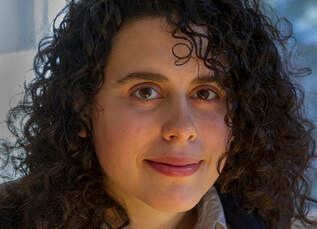Floor is the layer of boards or stone or mud on which people tread. It is wishful thinking to equate floor with foundation. To disregard what is underneath its dark ceiling. 
Emily Jaeger is the author of the chapbook The Evolution of Parasites (Sibling Rivalry Press). She was the 2017-2018 Olive B O'Connor Fellow in Creative Writing at Colgate University. Her poems have appeared or are forthcoming in The Indiana Review, B O D Y, TriQuarterly, and Passages North, among others. Emily has received support from LAMBDA, TENT, and the New York State Summer Writers Institute and holds an MFA from UMASS Boston. Read more of her work here.
|
Floor
First the floor happened and then I started running. I always called it the floor afterwards, though perhaps the fire or the branding might have been more exact. What I had done was burn a small circle into the dining room floor. The bottom of a lit tea candle. Then sanded the black char from the scorch and applied lemon juice. Now there was a small, off-color indent. Then I lied about it. A knot in the wood, a bruise. Perhaps it is not circumspect in the first paragraph of an essay to admit to being a liar. Nor was it circumspect at the time to lie, on the phone to my mother. She was back home with her ruined floor and I was back in Maine with my bosses’ ruined crop of everything: tomatoes, beans, eggplant, anything that could grow wiped out by a month of rain in July. Lyre I loved her because she played guitar and sang with a raspy voice. Because she wore bright dresses with inexplicable patterns. I nearly yelled at her when she wore sparkling green eye-shadow to meet my parents for the first time. I was hoping they wouldn’t realize I was so unfeminine, in comparison. I loved that she was more feminine: her breasts had been sized E and F before she cut them down to a more reasonable C. In a grey morning light she looked like Michelangelo Pistoletto’s “Venus of the Rags,” her soft curving body strewn in the remains of silver-flecked scarves and pin-on cloth flowers. I loved that I found Michelangelo Pistoletto’s “Venus of the Rags” in her coffee table book of twenty-first century art. She had art! She had a coffee table! flɔ(ə)r/ I look up the etymology of floor. I realize I have been saying the floor for a long time. A period of ten years—like a biblical seven or forty—begs introspection. I’m always dazzled by that trick in poetry where the author dissects the etymology of a word: prophylaxis is Greek for an act of guarding or nuance in French meaning to shade,[1] something hidden. Ta-da! The jig’s up. The conceit easily solved. The reader must accept based on fact, based on the word itself, the supreme wonder of the poet’s argument. But the floor has few easy secrets. Even in Beowulf, Grendel rip[s] open / the mouth of the building, maddening for blood…/ pacing the length of the patterned floor (flor).[2] People have been saying the floor for a long time and meaning nothing else. Fleur That summer I was working on the drowned farm. Before the rain, my boss discovered another problem: the previous owner had sold the topsoil. This could be compared, perhaps too easily, to pulling off the skin. The ground in which something was meant to grow was gone. We planted anyway. Then another problem: the old barn had been cleaned out to its foundation. Perhaps that same previous owner had drug a hundred years’ worth of manure in a straight smear from the entrance of the barn into the field. When our plants finally came up, each row grew in a bell-curve, Joseph’s dreams re-spliced: a couple yards of sickly lettuce before a fat bloom and then slowly sickly again. I realized I was sick the day I tried to trellis the peas. The green-grey shoots had grown too long to stand up on their own. I needed to work my way down the row, tying the tendrils loosely to plastic lattice. The plants kept falling out of my hands and my throat was excruciating. By the end of the day, I visited the doctor—about a 30 mile drive out, nearly falling asleep at the wheel in both directions. My mother drove up the three hours to Maine and shuttled me back to Boston, where I’d stay by myself for about two weeks to recover from the worst phase of mono while my parents were out of town. I hadn’t seen her all summer, so I called her. Floored To be stunned, pass out. To lose consciousness for a moment but not entirely. The mind is speechless, a blank, flat plain. There was once a great shape here and it was erased. The grey-pink eraser crumbs wait like fossils. Flirt I have a tendency to confuse everything with ritual. The field with prophecy, my lover with votive statuary. I blame Jewish Day School and its scorched earth approach to fusing religion into every tiny fold of grey matter. There’s even a blessing for shitting. Everything is a pun: the word for electricity is also Ezekiel’s bursts of lightning, bones plugging into each other and jerking in a yellow field. Love is David and Jonathan crying, nearly biting each-others’ mouths and worship: to burn an ascending order of doves and heifers. This I lay before her: two bags of tea-lights arranged in a circle around a small table, Black-eyed Susan and the ferns I cut from the beds out front. Five library books on the history of Italian cuisine. Did you know the salad course is last? That pasta is an appetizer? I ground garlic, bread, basil, and lemon into a verjus sauce over tofu. Mushroom and walnut ravioli I kneaded and rolled by hand. To keep her from getting sick too, I covered my face with a silver-threaded scarf she’d bought me until we ate. I washed my hands with rubbing alcohol. Love She added an “s” onto the end of words where it didn’t belong, called me “babes.” Her skin was extremely soft, almost breakable over her curves. Sometimes I would ask if I could touch just under the rim of her jeans to feel the skin there, which was the softest. She smelled like fresh bread. When I picked her up at the bus station she was holding a bouquet of sunflowers. She’d brought them from Western Mass where she worked, her first job after college, staffing an organic Jewish retreat center where they slaughtered their own sheep. We didn’t kiss—I had mono. We didn't have to kiss. But all I wanted was to knead her lips over and over—warm—pink—wet—between my teeth as I breathed in her shiny curls, along her neck. Heads tilted towards each other, her breath on my upper lip, calling. Try to kiss me. Try to kiss. Try to. The light hurt my eyes. The living room, full of windows, full of her moans as she dragged me from couch to couch, not kissing. Were we wearing clothes anymore? I couldn’t see. She had me up on her knee, fingers thrust inside me, begging, as I rocked into this sweetness, this light. Flare She noticed it before me, between bites of the mushroom filling: one of the candles near the corner smoking in its little dish. I grabbed my glass of water and doused the flame while she circled the room, blowing out the others. Then I served her a blood-orange salad with shallots and honey. Flor Floor is the layer of boards or stone or mud on which people tread. It is wishful thinking to equate floor with foundation. To disregard what is underneath its dark ceiling. My dread. My mother paces the length of the newly patterned floor. It wasn’t just one burn but a hundred other slight circles melted into the shellac, the color she’d picked to match the cabinets. A stripe of red cherry laid below each doorway. Her daughter and her daughter’s lover. Is this what two women do? My mother and I—two women whose relationship could be summarized: The familiar feeling of me ripping her open. The familiar feeling of her tearing me apart board by board. Flooring What I know: a wooden floor requires regular maintenance every five years. The shellac is sanded away, the boards buffed and smoothed. Damaged boards can be removed and replaced for a minimal cost, but is generally unnecessary for scuffs and scorch marks. To allow residents to remain in their home for the duration of the procedure, the room is sealed with plastic and a special vacuum separates the dust from the air. Furniture removal can be negotiated, often free of charge, especially if the contractor is trying to expand his business in a wealthy suburb. The contractor will do a home visit to determine the price. In a wealthy suburb, the price of regular maintenance for a room, 16’ x 20,’ is approximately 1300 dollars. The contractor then waits for a go ahead. What I know: after another ten years, the balance shifts from shellac to scuffs. A new pattern of every pace, chair pushed back, credenza skid, buffet, burn. A lush, grey field takes root and forgets. Lore The problem with ritual is the endless repetition. The compulsion of it. What is done three times is done for life: at eighteen my grandmother returning home to find her father had ripped her books into a white ash. At nineteen, I whisper to the teller to take out all my money, a pathetic year of student work. What was demanded. To pay for the floor. To sand and repaint. My mother’s casting-out is kept secret but I can feel the edges of it, radiating from her angry body. Her maddening hunger. Eve eats the fruit and hides beneath the leaves. Hesitates. A hundred green hands grasp her naked body. Her punishment is pain: love and birth will tear her open over and over. I took flight and the pain joined me anyway. All the angels and their silver swords of flame feasting at the mouth of what once might have been called joy. ----- [1] From Madness by Sam Sax, New York: Penguin, 2017. [2] From Beowulf: A New Translation by Seamus Heaney, Trans. Seamus Heaney, New York: W. W. Norton Inc., 725. |
